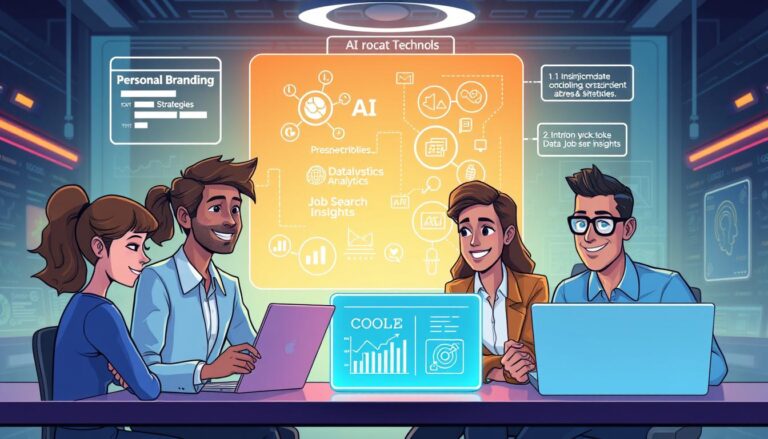Personalization Techniques Beyond Email Marketing
Expanding personalization strategies beyond email is crucial for engaging a broader audience. Social media offers customized content, influencer collaborations, and demographic targeting. Website customization, utilizing AI, enhances user experience with dynamic content and personalized recommendations. Dynamic content tailoring driven by AI optimizes user interactions with customized messaging. An omnichannel approach integrates AI across channels, ensuring real-time personalized content for a seamless customer journey. Mobile apps utilize in-app recommendations, user segmentation, and push notifications for individualized experiences. Discover more about advanced personalization techniques for effective marketing strategies.
Key Takeaways
- Social media personalization through targeted messaging and influencer partnerships.
- Website customization using AI for dynamic content and personalized recommendations.
- Dynamic content tailoring with AI-driven recommendations and interactive user experiences.
- Omnichannel approach with AI-driven personalization across customer touchpoints.
- Mobile app personalization via in-app recommendations, dynamic content delivery, and push notifications.
Social Media Personalization
Engaging customers on social media platforms through personalized content has become an essential strategy for businesses aiming to foster meaningful connections and drive conversion rates. Utilizing influencer partnerships and targeted messaging allows brands to reach specific audiences with authentic and engaging content. User segmentation plays a crucial role in tailoring messages to different customer groups, ensuring that the content resonates with their interests and preferences. By understanding the demographics, behaviors, and preferences of their audience, businesses can create personalized responses that enhance the overall customer experience.
Through social media personalization, businesses can craft messaging that speaks directly to the needs and desires of their target audience. This approach not only increases engagement but also builds brand loyalty and trust. By leveraging user segmentation and personalized responses, companies can create a more personalized and interactive experience for their customers, ultimately leading to higher conversion rates and long-term customer relationships.
Website Customization Strategies
Implementing effective website customization strategies is essential for businesses looking to enhance user experience and drive conversions online. By leveraging AI-driven personalization and focusing on user experience optimization, companies can create a tailored digital environment that resonates with visitors and encourages them to engage further. Here are three key strategies to contemplate:
- Dynamic Content: Utilize AI algorithms to personalize content based on user behavior, preferences, and demographics. By dynamically adjusting what each visitor sees, you can increase relevance and engagement, ultimately leading to higher conversion rates.
- Personalized Recommendations: Implement recommendation engines that analyze user data to suggest products or content tailored to individual interests. This not only enhances the user experience but also boosts cross-selling and upselling opportunities.
- Interactive Elements: Incorporate interactive features like quizzes, surveys, or personalized calculators to engage users and gather valuable data for further customization. Interactive elements make the browsing experience more enjoyable and memorable, increasing the likelihood of conversion.
Dynamic Content Tailoring
To further enhance user experience and drive conversions online, businesses can elevate their digital engagement strategies by focusing on Dynamic Content Tailoring. By leveraging AI-driven content recommendations, companies can deliver personalized content to users based on their preferences, behavior, and past interactions. This tailored approach guarantees that visitors are presented with relevant and engaging content, increasing the likelihood of conversion.
Dynamic Content Tailoring also enables businesses to create interactive user experiences that captivate audiences and encourage active engagement. Through dynamic elements such as personalized product recommendations, targeted promotions, and tailored messaging, companies can provide a more personalized and immersive online experience for their customers.
Moreover, by analyzing user data in real-time, companies can continuously optimize and refine their content strategy to better meet the evolving needs and interests of their audience. This dynamic approach not only enhances user satisfaction but also drives higher levels of engagement and ultimately leads to increased conversions. Incorporating Dynamic Content Tailoring into digital strategies can have a profound impact on overall performance and competitiveness in today's digital landscape.
Omnichannel Personalization Approach
In today's dynamic digital landscape, an omnichannel personalization approach is crucial for businesses seeking to deliver seamless and cohesive customer experiences across multiple touchpoints. This approach integrates various channels such as websites, social media, mobile apps, and physical stores to create a unified and personalized customer journey.
Here are three key elements to take into account when implementing an omnichannel personalization strategy:
- AI-Driven Personalization: Utilize artificial intelligence technologies to analyze customer data, predict behavior, and deliver personalized content in real-time across all channels. By leveraging AI-driven personalization, businesses can tailor interactions based on individual preferences and past behaviors, enhancing the overall customer experience.
- Customer Journey Mapping: Map out the customer journey across all touchpoints to understand how customers interact with your brand. By visualizing these touchpoints, businesses can identify opportunities for personalization and ensure a consistent experience throughout the customer lifecycle.
- Data Integration: Guarantee seamless integration of customer data across all channels to provide a holistic view of each customer. By consolidating data from various sources, businesses can deliver more personalized and relevant content to customers, ultimately driving engagement and loyalty.
Mobile App Personalization Techniques
Mobile app personalization techniques play a pivotal role in enhancing user engagement and driving conversions in today's competitive digital landscape. By utilizing in-app recommendations and user segmentation, businesses can tailor the app experience to individual users, increasing satisfaction and loyalty.
| Personalization Technique | Description | Benefits |
|---|---|---|
| In-App Recommendations | Utilizes user behavior data to suggest personalized products or content within the app. | Enhances user experience and increases likelihood of purchases. |
| User Segmentation | Divides users into groups based on demographics, behavior, or preferences to deliver targeted content. | Improves relevance of content, leading to higher engagement and conversion rates. |
| Dynamic Content Delivery | Customizes content in real-time based on user interactions or location. | Increases user interaction and time spent on the app. |
| Push Notifications | Sends personalized messages to users based on their preferences or behaviors. | Improves user engagement and drives returning visits. |
| A/B Testing | Tests different versions of the app with segments of users to determine the most effective design or content. | Optimizes user experience and conversion rates based on data-driven insights. |
Data-Driven Personalization Methods
Harnessing the power of data-driven insights, businesses can implement personalized strategies that cater to the unique preferences and behaviors of individual users to enhance engagement and drive conversions. Data-driven personalization methods leverage advanced technologies to create tailored experiences for users, resulting in higher customer satisfaction and loyalty.
Here are three key approaches in data-driven personalization:
- AI-based Recommendations: Utilizing artificial intelligence algorithms, businesses can analyze user behavior, preferences, and historical data to provide personalized product recommendations. This not only enhances the user experience but also increases the likelihood of conversion by showcasing relevant items to the user.
- Personalized User Experiences: By collecting and analyzing user data, businesses can create customized experiences across various touchpoints, such as websites, mobile apps, and email campaigns. Tailoring content and recommendations based on user preferences can enhance engagement and foster brand loyalty.
- Dynamic Content Personalization: Through dynamic content personalization, businesses can deliver real-time, customized content to users based on their interactions with the platform. This approach guarantees that users receive relevant information, promotions, and updates, enhancing their overall experience and driving conversions.
Conclusion
To sum up, personalization techniques extend beyond email marketing to encompass various strategies. These include social media customization, dynamic content tailoring, and omnichannel approaches. These methods act as a compass guiding businesses through the intricate landscape of consumer preferences, helping them navigate towards successful engagement and conversion.
Just as a skilled navigator uses the stars to chart a course through uncharted waters, personalization techniques illuminate the path to deeper connections with customers.







